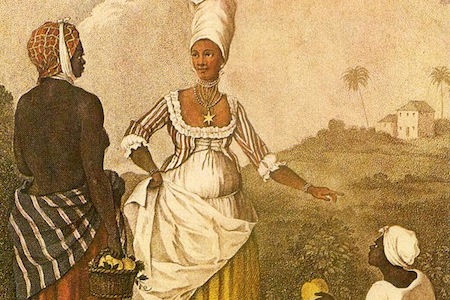The Caribbean Origins of American Slavery

The Barbadoes Mulatto Girl. Engraving published in London, 1779. Via Wiki Commons.
 What kind of influence can a small Caribbean island have had on the history of the United States? A profound one, it turns out. Barbados -- that small holiday haven which is fringed by the turquoise Caribbean Sea -- has a turbulent history, including a rebellion against the Commonwealth in the 1650s that presaged the American War of Independence a century later. This was resolved by the Charter of Barbados that read, “No taxes, customs, imports or excise shall be laid, nor levy made on any of the inhabitants of the island without the consent of a General Assembly.” Sound familiar? It is from this clause that the American rebels’ slogan “No taxation without Representation” was derived. Indeed, many historians argue that about half of the American Declaration of Independence was lifted from the Barbados Charter.
What kind of influence can a small Caribbean island have had on the history of the United States? A profound one, it turns out. Barbados -- that small holiday haven which is fringed by the turquoise Caribbean Sea -- has a turbulent history, including a rebellion against the Commonwealth in the 1650s that presaged the American War of Independence a century later. This was resolved by the Charter of Barbados that read, “No taxes, customs, imports or excise shall be laid, nor levy made on any of the inhabitants of the island without the consent of a General Assembly.” Sound familiar? It is from this clause that the American rebels’ slogan “No taxation without Representation” was derived. Indeed, many historians argue that about half of the American Declaration of Independence was lifted from the Barbados Charter.
But there is more. For Barbados was the first slave society in the English Americas -- that is, the first society entirely organized around its slave system—and the prototype for the plantation system throughout the Americas, including many colonies in what is now known as the United States. From Virginia to the Carolinas, the nightmare of slave society -- as developed in Barbados -- was replicated again and again.
In the latter half of the seventeenth century, the planters of Barbados feared being overwhelmed by the growing numbers of slaves. They decided that detailed regulation of the enslaved population was a necessity. The result was the 1661 Act for the Better Order and Governing of Negroes: the first comprehensive attempt in the English Americas to create a legal system for a society built upon slavery. It asserted that the lawmakers “could find in the body of English law… no tract to guide us where to walk nor any rule set as how to govern such slaves,” so the colonists felt free to invent new measures that they believed were “absolutely needful for the public safety” from a group that they characterized as “a heathenish brutish, uncertain and dangerous kind of people.” The Barbadian slave laws provided both a means for policing the enslaved population and a rationale for instituting special laws. It was copied across much of the English Caribbean and the English American colonies.
As well as establishing an elaborate framework of punishment to control slave behavior, the Barbados slave laws clarified some important ideological issues. One was that slaves would serve for life and in perpetuity, passing their status down to their children and their children’s children; an idea that gained currency across the region. This profoundly differentiated the black slaves’ experience not just from the indentured white servants on the island but also from that of most enslaved peoples in history; for the Africans in Barbados, once a slave meant always a slave, and for their children too. The colonists also redefined how slave status would be inherited. In contrast to the patrilineal tradition of their English homeland, the Barbadian planters decided that slave status should be passed down the maternal line. This mean that white men could continue to impregnate black slaves without having to free their offspring -- indeed, with the bonus that they could then own their progeny and profit from their unpaid labor.
The slaves of Barbados were classified in law as ‘chattels’ or property, meaning that they could be bought and sold, leased or used as collateral, which was in distinct contrast to the rights of the white indentured servants who had previously been the major labor force on the island. By differentiating so sharply between the rights of their black and white workers, Barbados set up a legal system that encoded racism. The indentured servants were now collectively protected as ‘white’ people -- a new term, which was so unfamiliar that it had to be explained to audiences in England as the expression used to describe Europeans living in the Caribbean. The impact of this legislation made complete the separation of black and white communities -- legal, social, psychological, cultural -- and created an ideology that justified (and still justifies) the ill treatment of people of color.
So the Barbadians helped to invent the concept of ‘whiteness’ and the privileges intrinsically connected with it. In so doing, they also helped to invent ‘blackness’ and its associated disadvantages. Across the Americas, whiteness became associated with social superiority and blackness with poverty and inferiority. The seventeenth-century Barbadian legislature did not just create the first blueprint for managing a plantation society and justifying a slave society; it also created the foundation and the blueprint for the inequalities between black and white that bedevil the United States to this day.
